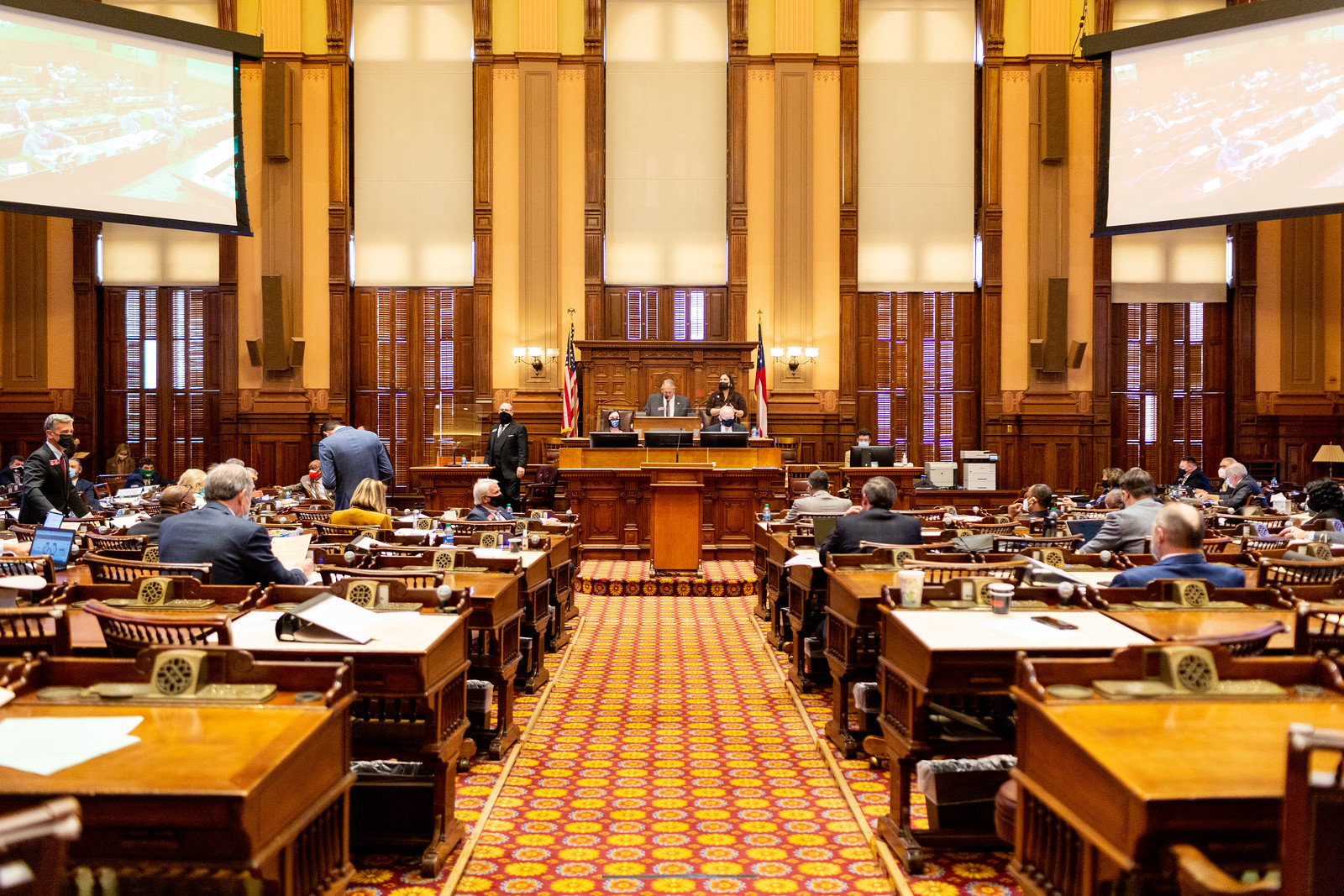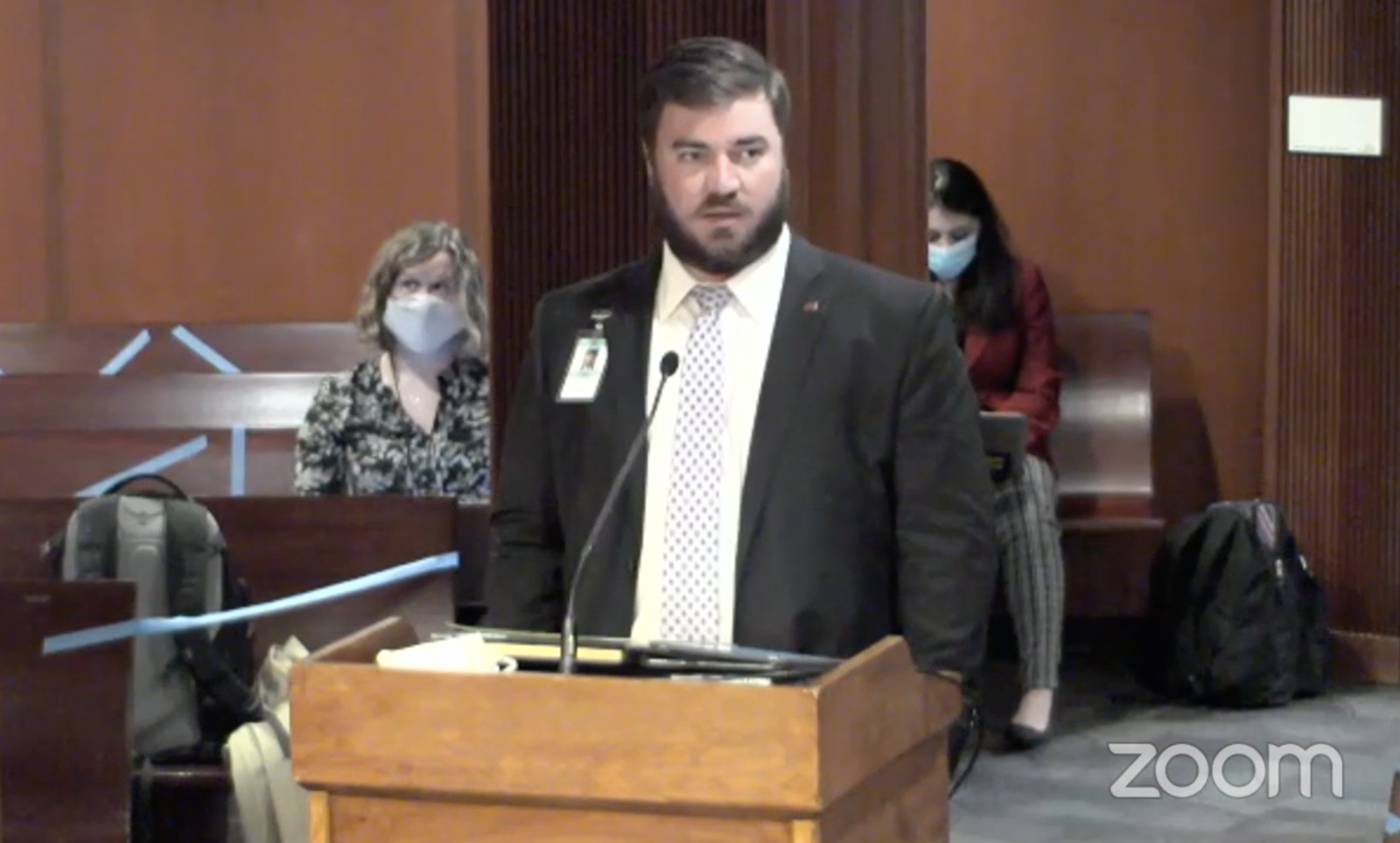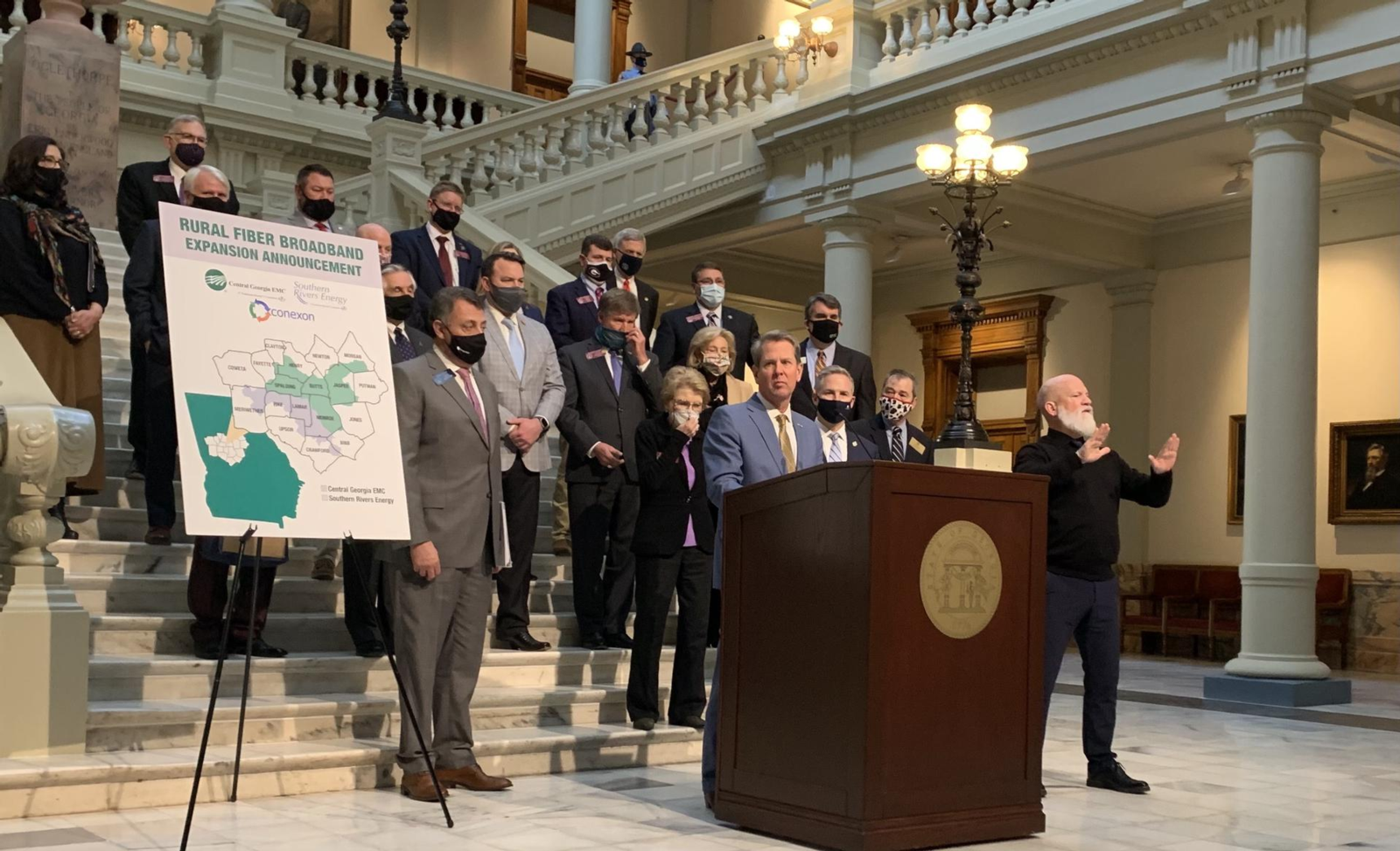Legislative Session Report Week 5
February 12, 2021
State News and Updates
GENERAL ASSEMBLY MEETS FOR FOUR DAYS, SETS SCHEDULE THROUGH MARCH 1
The General Assembly met for four days this week, wrapping up on Thursday. Lawmakers are scheduled to return to the Capitol on Tuesday, February 17 for legislative day 17. An adjournment resolution was passed, setting the schedule for the 2021 legislative session through day 25 on Monday, March 1.
The budget process continued moving quickly as the amended FY21 (AFY21) budget passed out of the Senate on Tuesday, was agreed to by the House on Thursday, and will now head to the Governor's desk. The $654 million increase focused on priorities of healthcare response, broadband, and education - incorporating $1,000 bonuses to most state employees and educators. Meanwhile, the House continued to work on the FY22 budget.
Georgia EMC hosted this week's Rural Caucus luncheon on Wednesday. It was a big week for the organization, who on Monday announced a partnership with Southern Rivers Energy and Conexon to provide high-speed internet to over 80,000 members in Central Georgia beginning this summer. You can learn more about the partnership and Governor Brian Kemp's press conference later in this report.
As we near the halfway point of this year's legislative session, Georgia Farm Bureau staff will continue monitoring the issues affecting our members - and Georgia’s number one industry - both under the Gold Dome and in Washington, D.C.

Speaker of the House David Ralston (R-Blue Ridge) presides over the House.
POLICY TALKS PICKING UP SPEED
Having completed 16 legislative days, the session is over halfway to the important crossover day, when bills must pass the chamber they originated in to remain eligible for final passage. Although there have been over 750 bills introduced so far this year, the pace has been unusually slow with the primary focus directed to the budgets. Only about 50 bills have been reported out of committees so far.
A few bills of interest to rural Georgians have been introduced thus far. HB 150, by Rep. Williamson (R-Monroe), seeks to prohibit local governments from banning the installation of certain fuel connections in construction as some cities nationwide are pursuing to meet their “green” goals. Agriculture uses a diverse portfolio of energy sources in production, as well as indirect uses from the making of fertilizers and processing plants. Georgia Farm Bureau staff testified in support of this bill to ensure producers continue to have all choices available, thereby ensuring competitive pricing and low-cost energy options. Sen. Tyler Harper (R-Ocilla) has introduced two bills we will continue watching, one increasing truck weights for 6-axle timber haulers up to 100,000 lbs (SB 118) and the second that would allow the burning of vegetation piles without a burn permit if certain stipulations are followed (SB 119).
For a more complete list of bills pertinent to agriculture and rural Georgia, as well as their current status, please see the Action This Week and Bills of Interest sections below.

Georgia Farm Bureau State Affairs Coordinator Alex Bradford testifies in support of House Bill 150 earlier this week
GEORGIA EMC ANNOUNCES RURAL BROADBAND INITIATIVE
On Monday afternoon, Central Georgia EMC announced a partnership with Southern Rivers Energy and Conexon to provide 80,000 homes and businesses in an 18-county radius with high-speed internet access, a direct result of last session's Senate Bill 2, sponsored by Sen. Steve Gooch (R-Dahlonega). Present for the announcement were Governor Brian Kemp, Lieutenant Governor Geoff Duncan, and Speaker David Ralston, and a host of legislators who were key in the passage of SB 2.
Through this partnership, Georgia EMC members in Bibb, Butts, Clayton, Coweta, Crawford, Fayette, Henry, Jasper, Jones, Lamar, Meriwether, Monroe, Morgan, Newton, Pike, Putnam, Spalding and Upson counties will have access to high-speed internet over the next four years - some as soon as this summer. An estimated $210 million is expected to be invested in this project.
Governor Kemp has continued to make rural Georgia a priority over the course of his term and echoed that sentiment at Monday's press conference. Lt. Governor Duncan expanded on the importance of the partnership, saying that high-speed internet is now more important than ever, particularly due to unexpected circumstances that the COVID-19 pandemic placed local communities and school systems in, claiming that broadband is foundational for success in rural Georgia to keep intellectual talent in local areas, forge economic growth and prosperity, and help rural students succeed in their educational pursuits.
With the addition of the Central Georgia EMC partnership, there are now twelve EMCs across the state that are either directly providing or partnering with other groups to provide access to high-speed internet in rural areas. To learn more about the partnership, you can view Georgia EMC's press release here.

Governor Kemp held a press conference regarding Georgia EMCs rural broadband expansion announcement Monday.
STATE REVENUE UP 7.5% IN JANUARY
Earlier this week, Governor Brian Kemp's office released Georgia's January net tax collection totals which, with an increase of $175.6 million over January 2020, puts the state revenue up by 7.5% compared to this time last year. The report also noted that year-to-date net tax collections are up 6.3% for a total of $898.1 million. The state's fiscal year began on July 1, 2020.
This is welcome news for legislators as the House moves to finalize their FY22 budget in the coming days. Despite the anticipated repercussions of the COVID-19 pandemic, state revenues for the first half of the fiscal year came in higher than expected and the legislature should be able to avoid making extensive, multi-billion dollar cuts to the FY22 budget as they did a year ago.
DIGGING IN WITH SENATE AG CHAIRMAN LARRY WALKER
Georgia Farm Bureau President Tom McCall sat down with new Senate Ag Chairman Larry Walker last week to "dig in" to the 2021 Legislative Session and Walker's priorities for Georgia agriculture. See their conversation below!
GEORGIA STATE HOUSE DISTRICT 90 SPECIAL ELECTION
A special election was held this week for Georgia State House District 90, previously held by Pam Stephenson (D-Lithonia). Stephenson resigned from her position and candidacy in September.
There were six candidates, all democrats, vying for the seat. As no candidate received more than 50% of the roughly 3,000 votes cast, the top two contenders - Stan Watson and Angela Moore - will move on to a runoff election on March 9.
House District 90 is based in DeKalb County. To check your district and voter registration status, click here.
ACTION THIS WEEK
HB 265:
Reps. Knight, Williamson, and Blackmon
House Bill 265 aims to clean up the state's revenue code, a large portion of the bill relating to tax-relief measures stemming from federal Covid-19 relief legislation. Included in the bill is a measure which would make certain Payroll Protection Program (PPP) loans tax exempt. Under SB 265, businesses eligible for PPP loan forgiveness would not be required to pay state taxes on the loans, even though they count as income. The measure also lets those business owners claim tax deductions on the loans.
Passed the House on 2/9/2021. Assigned to Senate Finance Committee on 2/10/2021.
HB 336:
Reps. Corbett, Dickey, Pirkle, Jasperse, and Watson
Following two years of extensive legislation establishing Georgia's new hemp industry, HB 336 is a cleanup bill seeking to alignn Georgia's hemp laws to match federal standards.
Assigned to House Agriculture and Consumer Affairs Committee on 2/9/2021.
SB 118:
Sens. Harper, Burke, Tillery, Goodman, Anderson, and Kennedy
SB 118 would increase truck weights for 6-axle timber haulers up to 100,000 lbs.
Assigned to Senate Transportation Committee on 2/10/2021.
SB 119:
Sens. Harper, Goodman, Burke, Mullis, Anderson, and Walker
Under Senate Bill 119, you would not have to obtain a burn permit to burn leaf piles, yard debris, or hand-piled natural vegetation, given that you meet guidelines regarding time, location, and others.
Assigned to Senate Natural Resources and Environment Committee on 2/10/2021.
SB 141:
Sens. Anavitarte, McNeill, Thompson, Robertson, Hickman, and Gooch
SB 141 would require immediate counting and tabulation of ballots following the closure of polls until counting and tabulation is completed.
Assigned to Senate Ethics Committee on 2/10/2021.
SR 83:
Sens. Miller, Gooch, Walker, Burke, and Albers
This resolution proposes an amendment to the Constitution that would allow members of the House of Representatives to serve four-year terms of office and the Senate to serve six-year terms.
Assigned to Senate Government Oversight Committee on 2/10/2021.
BILLS OF INTEREST
HB 44:
Reps. Cantrell, Greene, Barr, Werkheiser, Gambill, Williams
This bill would require Georgia to observe Daylight Savings Time year round.
House State Planning and Community Affairs Committee favorably reported on 1/29/2021.
HB 90:
Reps. Williamson, Burns, Dickey, Hatchett, Morris, Watson
HB 90 seeks to address an issue that the existing 1939 statute does not appropriately cover modern forestry practices with in regards to mill purchases of cut timber and the chain of liability that follows such transactions. The legislation is supported by both the Georgia Bankers Association and the Georgia Forestry Association.
Assigned to House Judiciary Committee on 1/26/2021.
HB 139:
Reps. Mainor, Dukes, McClain, Mallow, Thomas
This bill would prohibit trains from blocking any traffic crossing for longer than 15 minutes (with exceptions for safety reasons), and also require signage at crossings providing a telephone number to report such instances.
Assigned to House Transportation Committee on 1/28/2021.
HB 150:
Reps. Williamson, Hatchett, Kelley, Frazier, Parsons, Smith
In a concerning trend, some state and local authorities in the U.S. have adopted measures banning the connection of certain fuels (propane and natural gas) in new construction in an effort to reach their “carbon free” goals. HB 150 would prohibit government entities in Georgia from banning the connection of any utility service based on the type or source of fuel. GFB supports this bill, as many agricultural producers rely on these resources.
Assigned to House Energy, Utilities, and Telecommunications Committee on 1/28/2021.
HB 282:
Reps. Meeks, England, Hatchett, Watson, and Dickey
This bill provides clarity to the ad valorem taxation of qualified timberland property by defining parameters for “contiguous” property, specifying how the appraised value of timberland property is calculated, and clarifies the required documentation landowners must submit to the Commissioner of Revenue for certification.
Assigned to House Ways and Means Committee on 2/4/2021.
SB 29:
Sen. Anavitarte
This bill would require those wishing to vote in a Georgia election by absentee ballot to include a photocopy of their driver's license, voter ID card, U.S. passport, government employee ID, military ID card, or tribal identification card both when applying for an absentee ballot application and when returning it. Members of the military and overseas voters would be exempt from this requirement.
Assigned to House Ethics Committee on 1/28/2021.
SB 30:
Sens. Beach, Harbison
Senate Bill 30 would provide for pari-mutuel horse racing in the state at a limited number of licensed equestrian centers, create the Georgia Horse Racing Commission, and provide for the comprehensive regulation of pari-mutuel horse racing and related activities.
Assigned to House Regulated Industries and Utilities Committee on 1/28/2021.
SB 65:
Sens. Gooch, Miller, Cowsert, Tillery, Harper, and Hatchett
In a continued effort to expand broadband access to rural and un-served communities, this legislation allows the Public Service Commission and Department of Community Affairs to utilize a portion of the Universal Access Fund for such services.
Assigned to Senate Regulated Industries and Utilities Committee on 2/2/2021.
SB 100:
Sens. Watson, Dugan, Kennedy, Miller, Au, and Burke
This bill would require Georgia to observe Daylight Savings Time year round.
Assigned to Senate Government Oversight Committee on 2/8/2021.
GEORGIA AG FORECAST PRESENTATIONS AVAILABLE
Recordings of the general and breakout sessions of the 2021 Georgia Ag Forecast webinar are available here. You can also use the same link to access the complete 2021 Ag Forecast Outlook Report and the 2021 Ag Snapshots booklet. For a hard copy of Ag Snapshots, please contact your local Extension office.
Those who attended the webinar live are encouraged to complete a short survey regarding their experience so that the University of Georgia College of Agricultural and Environmental Sciences can determine the best way to proceed in delivering the Ag Forecast program moving forward. The survey can be accessed here.
Federal News and Updates
USITC BLUEBERRY IMPORT DETERMINATION
Following a lengthy investigation, the U.S. International Trade Commission (USITC) determined this week that fresh, chilled, or frozen blueberries are not being imported into the United States in such a way as to be a substantial cause or threat of serious injury to the domestic U.S. blueberry industry. The determination resulted from a 5-0 vote from the Commission.
Georgia Farm Bureau (GFB) and other allied ag organizations within the state, as well as many members of Georgia's Congressional delegation, supported this investigation and are disappointed in the Commission's decision. USITC is expected to submit its report containing the injury determination to the President by March 29, 2021. Upon the release of the public report, GFB staff will review and work with Georgia's producers to determine next steps.
To see USITC's press release on the investigation, click here.
U.S. HOUSE AGRICULTURE COMMITTEE HOLDS FIRST MARKUP ON NEW COVID-19 AID PROPOSAL
Earlier this week, the House Agriculture Committee, chaired by Georgia Representative David Scott (D), held its first committee markup on the agriculture and nutrition portions of the proposed Covid-19 aid package. The $16 billion proposal was approved by a party line vote of 25 to 23 late Wednesday. Its next stop on the way to the House floor will be the Budget Committee, which is charged with assembling reconciliation bills from multiple House committees into one package.
The proposal includes almost $4 billion for USDA to buy and distribute commodities, establish grants for small- to mid-sized food processors and producers, and provide assistance to maintain and improve the food and agricultural supply chain. It also includes an extension on the 15% increase to the Supplemental Nutrition Assistance Program (SNAP) through summer, among other things.
Chairman Scott released a statement regarding the committee's work on Thursday: “I am pleased that these very important provisions have been passed through the Committee, and I thank the Committee Members for their hard work during yesterday’s mark-up,” said Chairman Scott. “As I mentioned in my opening remarks yesterday, the COVID-19 pandemic is unlike anything the world has ever seen. It has affected every American and we must do what it takes to get the spread under control. The passage of the Agriculture Committee’s provisions gets us one step closer to feeding the hungry, supplying COVID-19 vaccinations to our rural communities, seeking equitable solutions for Black farmers and other farmers of color, and supporting our food and ag sector supply chains. I look forward to seeing the final passage of the full bill on the House floor soon.”
To learn more about what is included in the bill or to review the text in its entirety, click here.
REP. AUSTIN SCOTT BILL AIMS TO SIGNIFICANTLY INCREASE CCC'S BORROWING LIMIT
Earlier this week, Georgia Representative Austin Scott (R) introduced H.R. 843, which would more than double the Commodity Credit Corporation’s (CCC) borrowing limit. Currently set at $30 billion, the cap has been in place since 1987. Scott’s proposal would bring the limit to a total of $68 billion, accounting for the inflation-adjusted value of the current $30 billion cap, put in place over 30 years ago.
The CCC has provided much-needed funding to farmers and ranchers since its inception. The majority of payments for many farm bill programs, as well as supplemental assistance for nutrition programs, stems from the CCC. Additionally, recent Coronavirus Food Assistance Program (CFAP), Market Facilitation Program (MFP), and disaster payments have stemmed from the CCC funding umbrella. In September, Congress had to replenish the CCC as funds ran perilously low, sparking the need for a higher borrowing limit.
To learn more about Scott’s bipartisan bill, co-sponsored by fellow members of the Georgia delegation and supported by the American Farm Bureau Federation, click here.
CFAP 2.1 APPLICATIONS DUE FEBRUARY 26
On January 15, USDA announced additional assistance through the Coronavirus Food Assistance Program. Since that announcement, the Biden administration has halted processing and payments pending review. Local FSA offices will continue to accept applications while the administration evaluates the program. Should it be reinstated, this new assistance will include expanded eligibility for certain commodities and producers established in the recently passed relief package, as well as updated payments for producers who were eligible under previous iterations of the program. Producers have from January 19 through February 26 to submit new applications or modify existing applications if they have participated in the program already. For more information, click here.
MARCH 15 LAST DAY TO COMPLETE ENROLLMENT FOR 2021 ARC AND PLC PROGRAMS
Agricultural producers who have not yet enrolled in the Agriculture Risk Coverage (ARC) or Price Loss Coverage (PLC) programs for 2021 must do so by March 15. Producers who have not yet signed a 2021 enrollment contract or who want to make an election change should contact their local USDA Farm Service Agency (FSA) office to make an appointment. Program enrollment for 2021 is required in order to participate in the programs, but elections for the 2021 crop year are optional and otherwise remain the same as elections made for 2020.
Producers who do not complete enrollment by close of business local time on Monday, March 15 will not be enrolled in ARC or PLC for the 2021 crop year and will be ineligible to receive a payment should one trigger for an eligible crop.
ARC and PLC contracts can be emailed, faxed or physically signed and mailed back to FSA. For more information on ARC and PLC including web-based decision tools, visit farmers.gov/arc-plc.
NOT A MEMBER OF GEORGIA FARM BUREAU? JOIN TODAY!
The Georgia Farm Bureau Federation has a membership of almost 250,000 and serves as state's the largest general farm organization. Our goal is to provide leadership and assistance to the agricultural sector, to promote farm products, to aid in ag-related procurement, to be a spokesman for the farmer in the legislative arena, to be a leader in the development and expansion of farm markets, and to strive for more agricultural research and educational funds and facilities.
With members in all 159 Georgia counties, Georgia Farm Bureau is dedicated to promoting and improving agriculture in our counties, state and nation and in continually improving and expanding our service-to-member programs which serve to enhance the quality of life for all Georgians.
Membership in Georgia Farm Bureau is open to everyone. You don't need to be a farmer or have insurance with us to join Farm Bureau!
If you would like to become a member of Georgia Farm Bureau, you can start your membership online right now! We have a simple application process, and you can be our newest member in just a couple of minutes. Click the button below or use our County Office Locator to find the office nearest you.
Georgia Farm Bureau Public Policy Department Staff
Jeffrey Harvey, Director
Joe McManus, Assistant Director
Alex Bradford, State Affairs Coordinator
Raynor Churchwell, Agricultural Programs Specialist
Tripp Cofield, National Policy Counsel
Katie Duvall, Advocacy and Policy Development Coordinator
Renee Jones, Office Coordinator
Jake Matthews, Governmental Affairs Specialist
Jeremy Taylor, Agricultural Programs Specialist
** Photos courtesy of Georgia House and Senate photography gallery.


